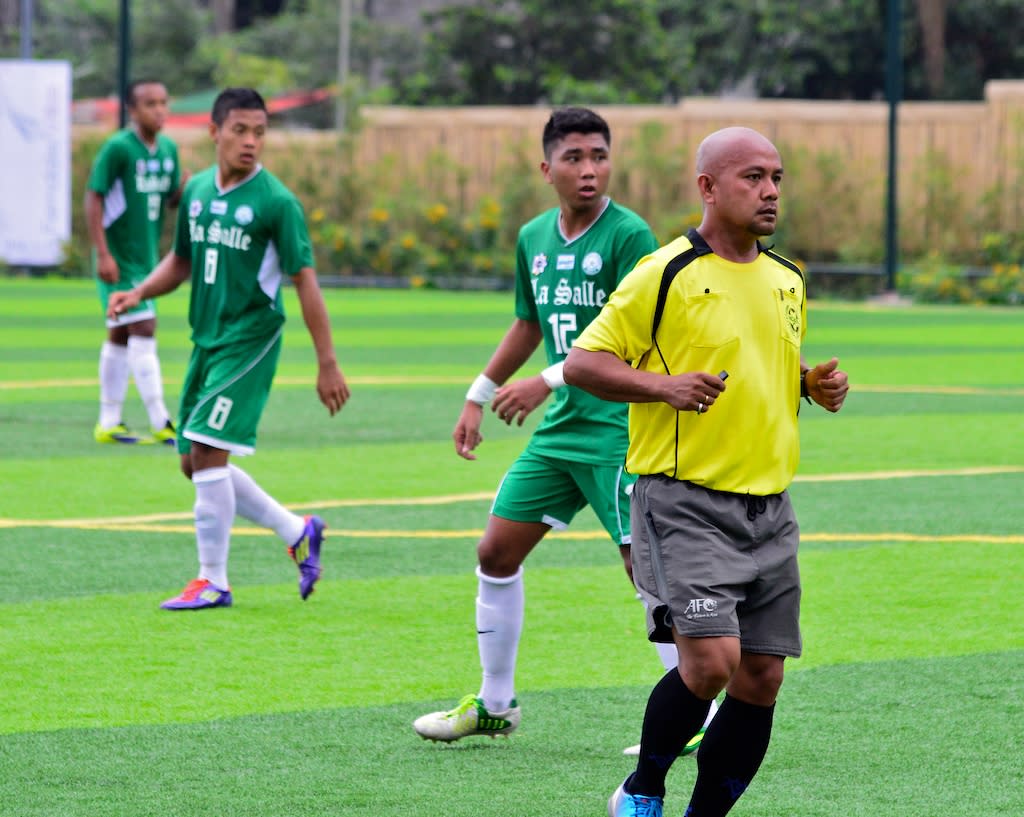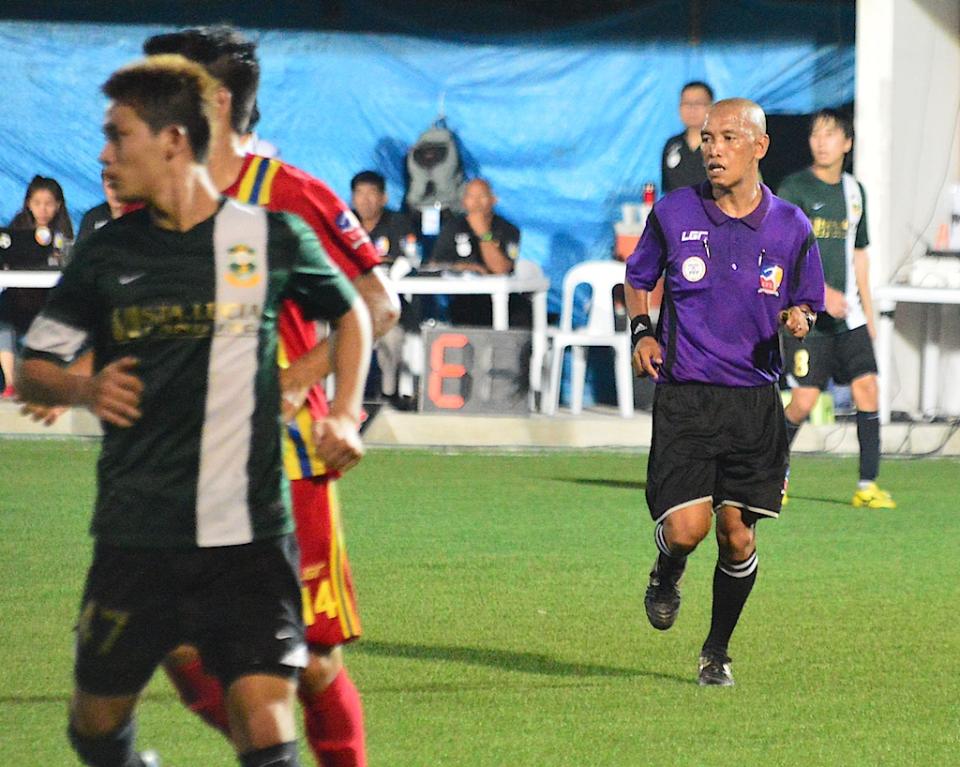Why can’t we have better Football refereeing? Part 3: Solutions
This is the third of a three-part special report on The Passionate Fan about the state of Football refereeing in the Philippines. Part one can be found here, and part two here.
So what can be done to bring officiating forward? Or maybe we, as Filipinos, are simply incapable of producing top-class referees? That obviously isn't the case.
There are some excellent Filipino referees who are respected and experienced in their craft. And naturally, like many hard-working and talented Pinoys, they have gone abroad to earn more while plying their trade.
Jovanie Villagracia is a Filipino referee from Dipolog who now makes his home in Macau, where he officiates in the Macanese first division. He is there with a handful of other Pinoy refs, like Randy Estremos from Cebu. Villagracia is a full-time referee on a two-year contract. He was the man in the middle when the Azkals met David Beckham's L.A. Galaxy in December of 2011.
Villagracia outlines several areas of improvement, starting with a lack of qualified, accredited referee instructors.
Edwin Alobin is the chairman of the RIFA referees committee and has also served as a match commissioner in the UFL. He says there are only four referee instructors in the entire Philippines who have been licenced from either the Asian Football Confederation or FIFA. They are himself, Montano “Taruc” Mondia, Jimmy Somogod, and Dennis Estaniel.
ALSO READ: Puyol undecided on Barcelona future.
Yes that is right. There are only four people in the entire Philippines who are qualified to teach Football refereeing. That is pathetic. I don't know how many instructors there are in other countries, but I'm damn sure it's more than four.
Imagine if there were only four professors of civil engineering in the Philippines. I'd rather swim across every river I encounter rather than take my chances on a bridge.
The Philippines doesn't even have a referee instructor on the books of the ASEAN Football Federation, much less the AFC or FIFA.
Obviously the powers-that-be in Filipino Football need to identify referee instructor candidates and pay for their training. We need to teach the teachers of the art and science of refereeing.
Villagracia also recommends that there be a greater recruitment of new referees, especially young ones, and to provide good benefits and salaries so that they can make refereeing their profession.
These two go hand in hand. Refereeing needs to be professionalized, and by that I mean refs need to do this job full time. Right now they are all part-timers who have to do other jobs to survive.
It's very hard to be really really good at something if you're not focused on it full-time. That's true whether you're a concert pianist, businessman, lawyer, or Football referee.
ALSO READ: Tiger cracks US$1.3 billion in career earnings.
Full-time refs need to be paid much, much more than what they are getting now. Perhaps they need to have a monthly retainer aside from game fees. And or course, continuing refresher courses, like what the league offered to the refs last year through Singaporean instructors.
Bigger wages for refs will entice more young folks to see refereeing as a viable, even lucrative career path. (International call-ups can be a windfall.) More refs mean more competition, and that will translate to better officiating.
Villagracia also believes in training more referee assessors and match commissioners to help guide the on-field officials. A referee assessor (usually a retired former referee) is supposed to give an unbiased, detailed report on the performance of the main referee and assistant referees to help the league or competition evaluate their performance.
I was told by a very reliable source that in one competition, a referee assessor gave a glowing report on the referees in one game, even though they allegedly made numerous mistakes. The assessor and the on-field refs all came from the same province.
There was talk of bringing over Spanish referees to the local leagues at one point. I think it would be better instead to bring in experienced foreign assessors instead. That would help raise the level of refereeing while not depriving local referees of work.
Villagracia also feels that a categorizing system should be put in place to determine which refs can work the top leagues and which must hone their skills in lower competition. In other words, a meritocracy independent of political color that rewards good refereeing.
ALSO READ: Pettis on Anderson Silva: I hope he doesn't come back.
It becomes clear to me that there is no quick fix when it comes to Football officiating. It will take a concerted effort from fans, teams, administrators, players, and coaches. And of course, the referees themselves will have to up their game and be open to learn. And no, we cannot shout and curse our way to better officiating. Of course, all this will also take time.
But one thing is certain; the Footballing community needs to throw more resources (read, money) at refereeing. There are no ifs, ands nor buts about it.
We don't mind splashing thousands of dollars a month on sexy foreign strikers. We don't blink when millions are poured into building new stadiums or renovating old ones. We deem it proper to lavish money on youth programs to hone the skills of youngsters. And yet officiating, one of the bedrocks of the sport, gets loose change. Right now we are getting what we are paying for.
It's like we bought a Ferrari with a 500 horsepower V12 engine, and stuck skinny, thirteen-inch high, 155mm wide tires on it. With cheap steel rims.
When one component of the equation is not up to spec, the whole organism suffers. We could have the finest players in a match but if a weak referee is there, the game could be ruined.
I'd love to see a UFL first division that pays a main referee P5000 a match and assistant refs P3000. But coupled with the higher wage, greater pressure to perform and the possibilty of demotion if they don't.
The refereeing profession, now so maligned, needs more respect. Referees need to be appreciated and held in high esteem.
“A referee is like the conductor of an orchestra” says Miguel David, the Filipino FIFA and AFC match official. “Who determines when the game starts and when it ends? Not the coaches. Not the players. It's the referee.”
David then recounts a surprising fact.
“People forget how Football started” he says. “FIFA was created mainly by referees. The first few FIFA presidents were referees. Their main job was not to develop Football, but to unify the rules of the sport.”
“Referees are the foremost guardians of the game.”
Follow Bob on Twitter @PassionateFanPH.




